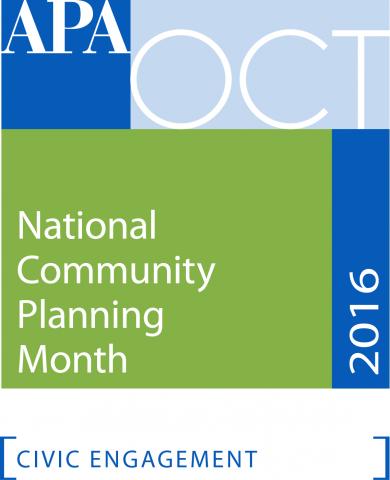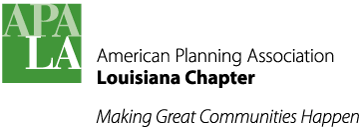National Community Planning Month

Established in 2006, National Community Planning Month is celebrated each October as a way to highlight the role of planners and the importance of good planning in our communities. Across the country, communities celebrate planning through a variety of avenues including have a mayoral proclamation declaring October as community planning month; planning department open houses; community tours; or photo contests. Planning is essential for our communities to prosper and maintain balance and cohesiveness.
Each year, a theme is identified to help a community plan highlight an aspect or outcome of planning. The theme can be used to organize events and activities within the community. This year, the theme is civic engagement. The theme underscores the necessity of engaging the public, elected officials and key leaders in discussions that shape the future of our cities. Thoughtful, local planning cannot happen without meaningful civic engagement.
Key Messages
National Community Planning Month is a time to highlight the important role of planning in our communities. Planning can be summed up as comprehensive, community-focused and enhancing choices. While many people may not realize it, planning has a significant impact on their day-to-day life. From where they live, to how they commute, to the type of home they live in, planning plays a vital role in a person’s day.
Planners help create communities of lasting value. In a public opinion poll from 2014, APA found that 67 percent of poll respondents believe community planning is important for economic recovery.
Planners are skilled at balancing the varied interests and viewpoints that emerge as a community plans its future. Planners consider what is best for the entire community – senior citizens, workers, children, disabled, business owners, and elected officials. How do they arrive at these community-wide decisions? Through conversations with residents and thoughtful outreach to community stakeholders.
Planners work for the greater good. Planners work with professionals from different fields such as public health, recreation and engineering to make communities safer and healthier. Planning does not stop at a geographic border. Communities are served best when planners take a broader viewpoint, encompassing regional and statewide perspectives.
Planners have the unique expertise to comprehensively address the impacts of today’s actions on tomorrow’s communities. Planners do not just focus on where to locate (or site) a building, but also consider how that decision impacts the safety of the community, the existing character of the community, how it impacts the environmental resiliency, and if the decision encourages social and economic diversity.
More than 15,000 planners have earned their professional certification. Certified planners pledge to uphold high standards of practice, ethics and professional conduct, while keeping their skills sharp and up-to-date by pursing advanced professional education.





